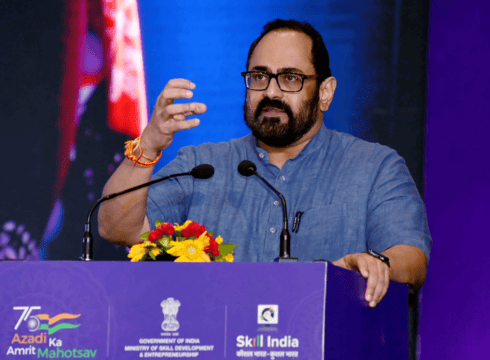MoS IT Rajeev Chandrasekhar will hold a meeting with stakeholders, including consumers, lawyers, and industry representatives, on March 9 in Bengaluru
The Digital India Bill will likely have norms to regulate online platforms such as social media sites, ecommerce portals and also fact-checking websites
The government will first consult the public on what the core tenets of the proposed legislation ought to be and will then roll out the final draft of the Bill
Inc42 Daily Brief
Stay Ahead With Daily News & Analysis on India’s Tech & Startup Economy
The Centre will begin consultations on the skeletal form of the upcoming Digital India Bill on March 9, Minister of State (MoS) for Electronics and Information Technology Rajeev Chandrasekhar reportedly said.
“The government was waiting for the process for the Data Protection Bill, online gaming rules etc. to be completed. Now we can move to the most important piece of our larger framework for the internet, the Digital India Bill, which will be a global standard law for the next decade,” Chandrasekhar told Indian Express.
Taking a different approach, the government will not release the entire draft for public feedback at the outset. It will first consult the public on what the core tenets of the proposed legislation ought to be and will then roll out the final draft of the Bill, the publication reported.
As part of the consultations, Chandrasekhar will hold a meeting with stakeholders, including consumers, lawyers, and industry representatives, on March 9. The meeting will be held in Bengaluru and will likely see the MoS present a basic framework, architecture and guiding principles for the Digital India Bill.
Chandrasekhar noted that the Bill will be focused on ensuring that the internet in India is open and free from user harm and criminality. He also said that the proposed norms would ensure that there is an institutional mechanism of accountability for the players involved.
The MoS also said that the proposed Bill will deal with spheres such as emerging technologies, algorithms of social media platforms, artificial intelligence and user risks. Besides, it will also cover aspects such as the diversity of the internet and regulation of various types of intermediaries.
This comes weeks after it was first reported that the government would begin stakeholder consultation on the draft norms in March. However, back then, Chandrasekhar told a publication that the first set of consultations would be held in New Delhi.
He also said then that the government was awaiting representations from social media platforms on building a self-regulatory mechanism for fact-checking information. It could not be ascertained if the submissions have been made by industry players.
The government has released a slew of new norms in the recent past, including the Telecommunications Bill and the Digital Personal Data Protection Bill to govern India’s digital landscape.
Previously, it has been reported that the upcoming Digital India Bill would introduce penal consequences for violations and would extend the ambit of government’s powers to include emerging technologies such as metaverse and blockchain.
The upcoming norms are also likely to have provisions for regulating other online platforms such as social media platforms, ecommerce portals and fact-checking websites.
The Digital India Bill has been envisaged to replace the two-decade-old Information Technology Act, 2000.
{{#name}}{{name}}{{/name}}{{^name}}-{{/name}}
{{#description}}{{description}}...{{/description}}{{^description}}-{{/description}}
Note: We at Inc42 take our ethics very seriously. More information about it can be found here.


